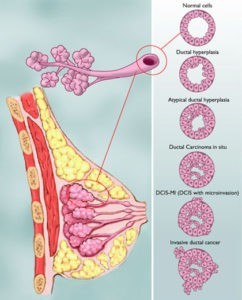The question is hugely important – DCIS is an epidemic. Blame mammography. To detect breast cancer in earlier, more treatable stages, mammography guidelines now call for screening women as young as age 40
Ductal Carcinoma In-Situ or DCIS is not cancer. Though people might call it cancer, it is “abnormal cells” or “pre-cancer.”
If you or someone you know has received a diagnosis of Ductal Carcinoma, please read the two articles linked below before undergoing therapy of any kind.

Keep in mind that treatment- chemo, radiation and/or surgery. can cause short, long-term and late stage side effects.
The issue is to understand the risks and benefits, pros and cons of all therapies- conventional or non-conventional.
The fact is there are many evidence-based, non-toxic therapies shown to reduce the risk of breast cancer. To put it more plainly, there are dozens of evidence-based, non-toxic therapies shown to reduce the DCIS patient’s risk of developing full-blown breast cancer.
To Learn More about DCIS- read the posts linked below-
Have you been diagnosed with ductal carcinoma in-situ? To learn more about evidence-based non-toxic therapies please scroll down the page, post a question or comment and I will reply to you ASAP.
To Learn About Pre-Myeloma (SPB, MGUS, MGCS, SMM), diagnostics, symptoms and therapies- click now
Thank you,
David Emerson
- Cancer Survivor
- Cancer Coach
- Director PeopleBeatingCancer
Tens of thousands of women are having surgery – sometimes even having both breasts removed – to treat a condition that is unlikely to ever become life-threatening.
In fact, a recent study concluded that a small, but growing minority of women with the condition – called ductal carcinoma in situ, or DCIS – are choosing to undergo a double mastectomy. That’s despite a lack of evidence for any survival benefit over less invasive surgery. But the fear is little surprise, given what’s unknown about DCIS.
UCSF breast cancer oncologist Shelley Hwang, MD, is bucking this trend toward more invasive treatment. Her clinical research team is investigating whether at least some women with DCIS can safely omit surgery altogether from their treatment. In the course of their studies, the researchers also hope to fill in some of the knowledge gaps surrounding the condition…
Hwang is exploring to what extent targeted drug treatment with careful follow-up might become a low-risk alternative to surgery for many of these women.
The question is hugely important – DCIS is an epidemic. Blame mammography. To detect breast cancer in earlier, more treatable stages, mammography guidelines now call for screening women as young as age 40, and compliance with screening guidelines has increased. When there was less screening, many fewer cases of DCIS were diagnosed.
“A derivative of vitamin A, known as retinoic acid, found abundantly in sweet potato and carrots, helps turn pre-cancer cells back to normal healthy breast cells, which may help explain why some clinical studies have been unable to see a benefit of vitamin A on cancer: the vitamin doesn’t appear to change the course of full-blown cancer, only pre-cancerous cells, and only works at a very narrow dose…”




